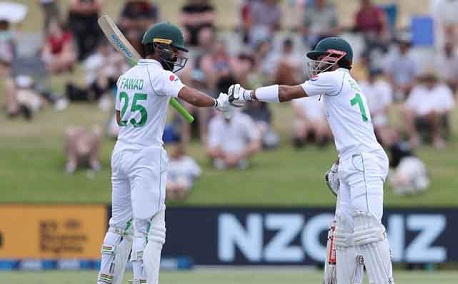Pakistan may have lost the first Test match against New Zealand but there were plenty of memorable moments for fans to enjoy. Arguably the highlight of the match was Fawad Alam pulling a boundary to the fence and scoring a century.
The moment was a special one for the left-handed batsman who returned to the squad earlier this year after several years and in fact, scored triple figures for the first time in an international Test match after 11 years.
People on Twitter posted the moment, with one fan inserting Celine Dion’s iconic Titanic song “My Heart Will Go On” as Fawad scored his century and celebrated the achievement.
Needless to say, Pakistani cricket fans were elated to see the cricketer score a century in Test cricket after so long.
Here’s why Fawad Alam’s century was so special
Alam scored a brilliant 102 off 296 deliveries, resisting the attack by New Zealand bowlers for around six hours and 36 minutes.
He added an important 165 for the 5th wicket with his counterpart Mohammad Rizwan.
This is the second Test century for Fawad Alam, who debuted in 2009 against Sri Lanka and scored a century on his debut. However, he was dropped from the Pakistan team in November 2009 and made a comeback only in August 2020.
The promising batsman waited for more than 11 years and five months to reach the three-figure milestone – the longest ever wait for a player to score another Test century without a war in between.
Warren Bardsley of Australia had to wait for 14 years and India’s Syed Mushtaq had to wait for 12 years – but both players witnessed World War I and World War II between their respective milestones.
Although Pakistan couldn’t accomplish what it initially planned, Alam’s persistence in the field and his on-point partnership with Rizwan was a beam of hope for Pakistani fans.
Fawad, who scored 102, stayed on the wicket for 396 minutes which is the longest stay on the wicket in the 4th innings of a Test by a Pakistani batsman outside Asia in the 21st century.
Asad Shafiq stayed on the wicket for 336 minutes in Brisbane against Australia in 2016.

















